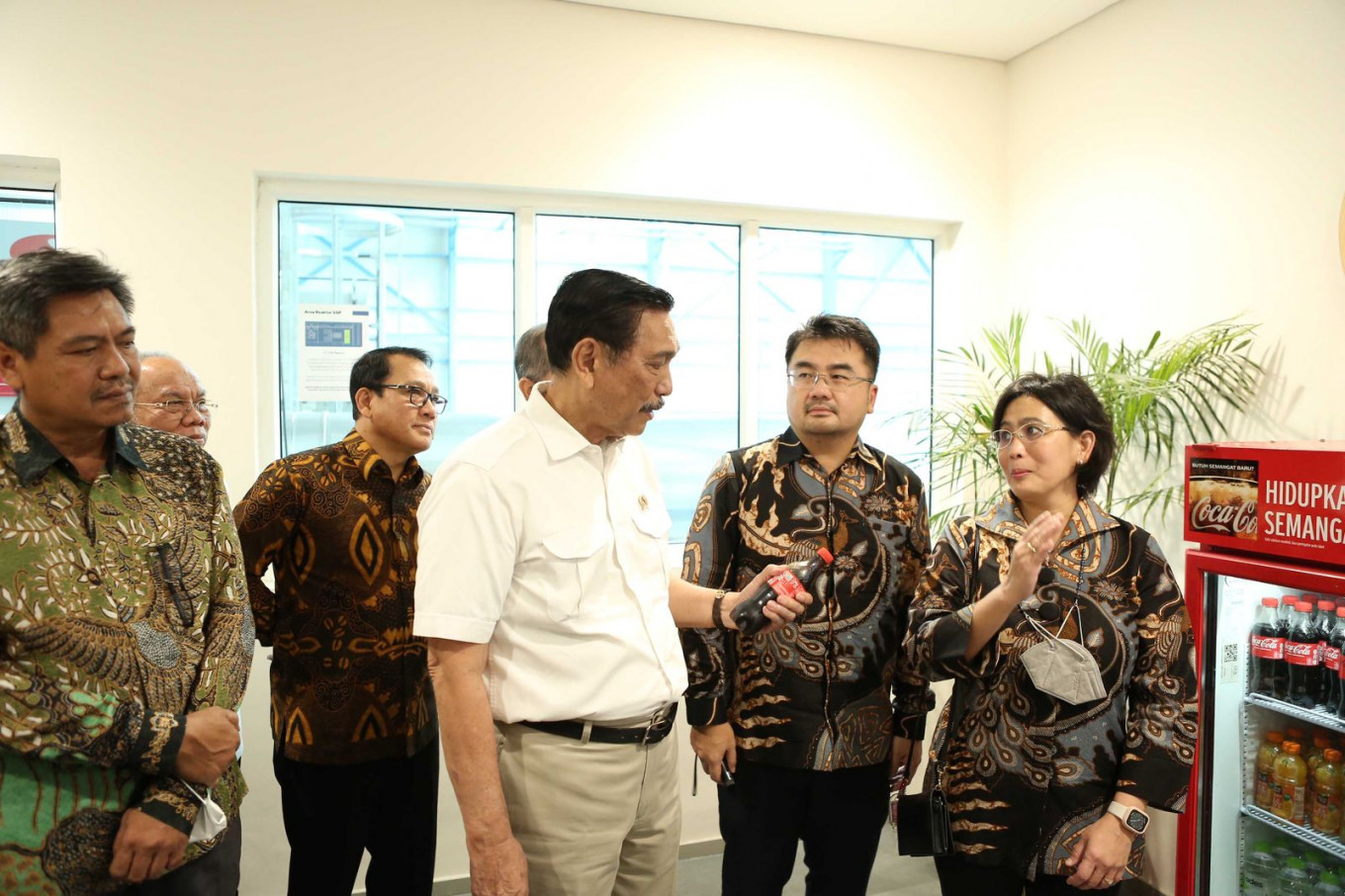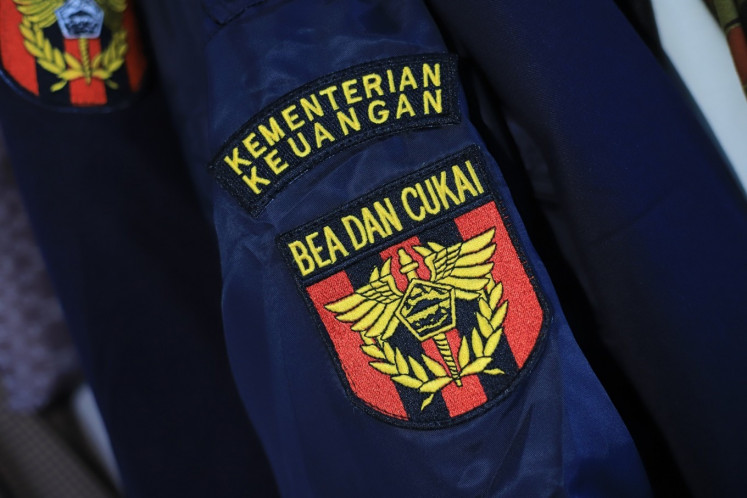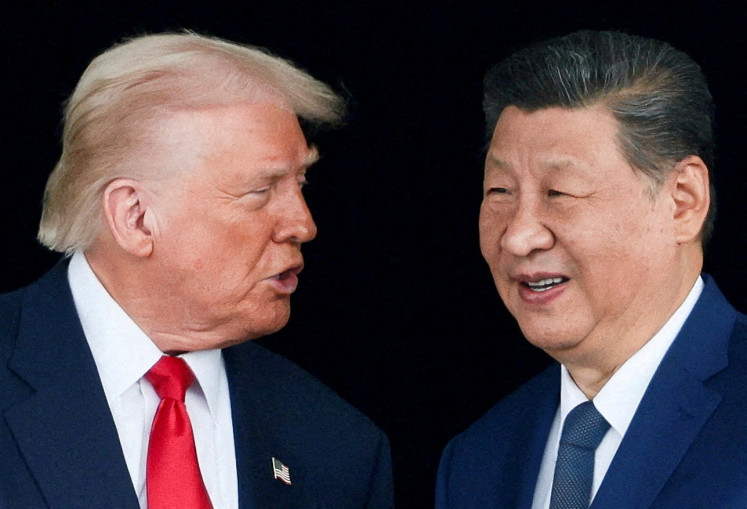Popular Reads
Top Results
Can't find what you're looking for?
View all search resultsPopular Reads
Top Results
Can't find what you're looking for?
View all search resultsCCEP Indonesia, Dynapack Asia unveil Amandina Bumi Nusantara PET recycling plant
Change text size
Gift Premium Articles
to Anyone
 Coordinating Maritime Affairs and Investment Minister Luhut Binsar Pandjaitan (center) speaks during a visit on Feb. 8, 2023 to attend the launch of Amandina Bumi Nusantara, a PET recycling factory in Bekasi, West Java, established as a joint venture between Coca-Cola Europacific Partners Indonesia and Dynapack Asia.
Coordinating Maritime Affairs and Investment Minister Luhut Binsar Pandjaitan (center) speaks during a visit on Feb. 8, 2023 to attend the launch of Amandina Bumi Nusantara, a PET recycling factory in Bekasi, West Java, established as a joint venture between Coca-Cola Europacific Partners Indonesia and Dynapack Asia.
C
oca-Cola Europacific Partners (CCEP) Indonesia and Dynapack Asia, the region’s leading rigid plastic packaging and components manufacturer, inaugurated on Wednesday the Amandina Bumi Nusantara polyethylene terephthalate (PET) recycling plant in Bekasi, West Java, as a major step in the two companies’ efforts to support the sustainable use of plastics.
Coordinating Maritime Affairs and Investment Minister Luhut Binsar Pandjaitan, in his opening remarks at the launch ceremony, lauded CCEP Indonesia and Dynapack Asia for their efforts to promote closed-loop plastic production while addressing Indonesia’s plastic waste problem.
“The government is committed to reducing ocean plastic waste by 70 percent by 2025. Therefore, it is essential that all stakeholders cooperate and participate in achieving this common goal,” Luhut said, referring to the government’s National Action Plan for reducing plastic waste in its seas.
“I hope that Amandina will play an important role in overcoming our country’s waste problem while delivering environmental and social benefits through the closed-loop system, as well as realizing a circular economy in Indonesia,” the senior minister said.
Minister Luhut expressed his hope that CCEP Indonesia and Dynapack Asia’s initiative would spur other industry players to implement closed-loop production to encourage a circular economy.
A circular economy is designed to prolong the lifespan of all existing materials, including plastics, by reintroducing them into the production line.
Jorge Escudero, president director for Indonesia and Papua New Guinea at CCEP Indonesia, also stressed the importance of a closed-loop approach to manufacturing that recycled plastic bottles and waste materials into reusable bottles. Recycling and reusing existing plastic materials, he explained, would reduce demand for virgin plastics by prolonging the lifespan and retaining the value of plastics.
“Our investment in the innovative bottle-to-bottle recycling system demonstrates our strong commitment to achieve a world without waste and to promote a circular economy in Indonesia,” said Escudero.
“Sustainability is a key aspect of our businesses, extending from sourcing and manufacturing to our communities and people, as well as our customers,” he said.
Also on Feb. 8, CCEP Indonesia and Dynapack Asia launched the Mahija Parahita Nusantara nongovernmental organization, or the Mahija Foundation, that supplies the Amandina plant with plastic bottles as feedstock.
The foundation also empowers pemulung (informal waste collectors) by improving their quality of life through stable employment, social care and educational facilities for their children, while providing guidance on responsible waste management practices.
“We are committed to ensuring the supply of high-quality rPET in accordance with government policies and international food safety standards, as well as promoting decent livelihoods and providing opportunities for waste collection workers and the surrounding community,” Escudero said, referring to recycled PET plastic.
Continuing, Escudero said he hoped that the establishment of Amandina and the Mahija Foundation would inspire other concrete actions and investments in waste collection and recycling initiatives that benefited not only the environment, but also local communities by building capacity.
Dynapack Asia CEO Tirtadjaja Hambali said the company was proud to partner with CCEP Indonesia as part of its commitment to integrate sustainable packaging in its production chain.
“By integrating responsible collection into the waste bottle supply chain, prioritizing safe working conditions and championing human rights, we are helping to realize our vision of a circular future and making a positive impact, one bottle at a time,” said Tirtadjaja.
“We hope that this will be the first of many initiatives in our pursuit of plastic circularity,” he added.
The new recycling plant and the community empowerment foundation were both established to support Dynapack Asia's global commitment to use at least 25 percent recycled resin in its packaging products by 2025.
Meanwhile, CCEP Indonesia has developed an ambitious waste management goal in line with the global company’s “This is Forward” sustainability campaign, which aims to incorporate rPET plastics in 50 percent of the materials it uses by 2025.
From trash to treasure
After the launch ceremony, guests were led on a tour through the factory’s Sustainability Hall to observe the entire process of producing rPET, starting with unwashed plastic bales and following their journey as they were turned into rPET pellets and finally, reusable rPET bottles.
At the start of this process, low-quality PET plastic bottles are collected and segregated by pemulung, waste banks and similar organizations. They are then distributed to waste collection partners who send the segregated waste to collection centers, where the plastic materials are compressed into bales.
These bales are supplied to Amandina, where the bales are sorted, flaked and washed before the material is melted and shaped into rPET pellets. After thorough decontamination to produce food-safe recycled resins, the rPET pellets are turned into solid material similar to virgin plastic and then made into parisons, or hollow tubes of plastic, that are blown and shaped into rPET bottles.
Within 12 hours, the Amandina plant can produce rPET bottles for filling with CCEP Indonesia products, as well as beverages from other fast-moving consumer goods companies.
The rPET bottles produced by Amandina have undergone a series of safety tests and have been declared compliant with Indonesia’s regulatory standards as well as The Coca-Cola Company’s strict global standards.
The Amandina plant uses the latest technologies with the support of innovations from packaging and bottling machine manufacturer Krones as well as recycling and refinement machinery supplier Starlinger. Using state-of-the-art sorting, grinding and washing and pelletizing facilities in its bottle-to-bottle recycling process, Amandina produces food-safe rPET products.
“Amandina’s smooth production is also largely supported by the community, from pemulung to waste banks and other actors along the value chain,” said Ardhina Zaiza, head of corporate communications at CCEP Indonesia.
The Mahija Foundation plays a significant part in ensuring the sustainability of Amandina’s operations. Aside from helping to improve the lives of pemulung communities, the foundation also works to create a safe and efficient supply chain while building capacity at other organizations through improved waste collection and segregation processes.
The collection centers collaborating with Amandina and the Mahija Foundation are fully audited and monitored to ensure that there are no human rights violations, such as child labor and modern slavery. In this way, CCEP Indonesia is able to guarantee that every resource in its value chain meets regulatory standards as well as its corporate values.
The Mahija Foundation also focuses on developing collection centers’ business strategies and management systems to help them achieve their PET feedstock targets.
The foundation also assists in boosting the centers’ productivity by providing equipment and infrastructure support, reorganizing their operations to improve efficiency and installing production scorecards to monitor daily production.
With the plastic feedstocks provided by Mahija Parahita Nusantara, the Amandina Bumi Nusantara plant is capable of producing up to 25,000 tonnes of rPET per year at an investment value of Rp 556.2 billion (US$37 million).
The Mahija-Amandina integrated closed-loop rPET production will help reduce virgin plastic, the primary raw material for bottle packaging, as well as virgin waste. It can also contribute significantly to reducing carbon emissions produced from manufacturing PET using virgin plastic, another goal set by the Indonesian government.










